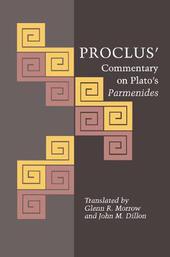
|
Proclus' Commentary on Plato's Parmenides
Paperback / softback
Main Details
| Title |
Proclus' Commentary on Plato's Parmenides
|
| Authors and Contributors |
By (author) Proclus
|
|
Translated by Glenn R. Morrow
|
|
Translated by John M. Dillon
|
| Physical Properties |
| Format:Paperback / softback | | Pages:664 | | Dimensions(mm): Height 235,Width 152 |
|
| Category/Genre | Literary essays
Western philosophy - Ancient to c 500
Philosophy - metaphysics and ontology |
|---|
| ISBN/Barcode |
9780691020891
|
| Classifications | Dewey:184 |
|---|
| Audience | | Professional & Vocational | | Tertiary Education (US: College) | |
|---|
|
Publishing Details |
| Publisher |
Princeton University Press
|
| Imprint |
Princeton University Press
|
| Publication Date |
21 October 1992 |
| Publication Country |
United States
|
Description
This is the first English translation of Proclus' commentary on Plato's Parmenides. Glenn Morrow's death occurred while he was less than halfway through the translation, which was completed by John Dillon. A major work of the great Neoplatonist philosopher, the commentary is an intellectual tour de force that greatly influenced later medieval and Renaissance thought. As the notes and introductory summaries explain, it comprises a full account of Proclus' own metaphysical system, disguised, as is so much Neoplatonic philosophy, in the form of a commentary.
Reviews"Plato's Parmenides was arguably the most important text in the curriculum of the Neo-Platonists, and is the key to understanding their philosophy. The influence of Proclus' commentary was immense... Morrow and Dillon's translation will stand as a landmark in Neo-Platonic literature."--Lucas Siorvanes, Journal of Hellenic Studies "Few now would turn to the commentary of Proclus, head of the Academy in the fifth century A,D. primarily in order to understand Plato. Nevertheless, the work is of great importance for the light it sheds on the interpretation of the dialogue by Proclus and his predecessors... [Scholars] have increasingly devoted attention to the way in which elaboration of the Neoplatonic metaphysical system went hand in hand with more and more complex interpretations of the hypotheses of Parmenides 137ff."--Anne Sheppard, The Times Higher Education Supplement
|